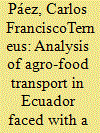|
|
|
Sort Order |
|
|
|
Items / Page
|
|
|
|
|
|
|
| Srl | Item |
| 1 |
ID:
176892


|
|
|
|
|
| Summary/Abstract |
The objective of this article is to analyze the food transport in Ecuador faced with a possible reduction in the subsidy of diesel, taking as a case study the Metropolitan Public Company Wholesale Marketplace of Quito, in order to identify guidelines for the formulation of strategies in the event of a reduction in the subsidy of this fuel. A bottom-up methodology is applied, which uses a survey as a tool, as well as secondary information generated by the state organizations. It is concluded that this investigation identifies the agro-food transport sector of the Wholesale Market. The median fuel consumption and energy intensity, of trucks that arrive with products at the Quito Wholesale Market, are 31 (l/100 km) and 15 (l/100tkm), respectively. The median percentage of the cost of fuel, with respect to the price of the product, is 1.2%. Meanwhile, assuming that the fuel subsidy was eliminated, and the price of diesel came to cost $ 2.27 USD/gallon; the median percentage of price increase in the product would be 1.6%. However, the low regulation on the sector makes the cost of agri-food more susceptible to a decrease in the subsidy.
|
|
|
|
|
|
|
|
|
|
|
|
|
|
|
|
| 2 |
ID:
180184


|
|
|
|
|
| Summary/Abstract |
Biofuels in Ecuador were born with the purpose of achieving an effective substitution of imports of petroleum derivatives. The objective of this research is to analyze the impact that biofuel production has on water, food, and energy, and its contribution to reducing the growing dependence on fossil fuels in the transportation sector in Ecuador. The analysis focuses on ethanol produced from sugar cane, which is used to produce Ecopaís gasoline. The methodology is composed of three parts. For the first part, Geographic Information Systems were used; for the second, the FAO Penman-Monteith method; and, finally, in the third, the energy consumption was obtained through secondary information. As a result, taking the year 2019 as a reference, ethanol became the ninth product with the largest amount of land suitable for agriculture, and the seventh with the most irrigated areas in a country that suffers from malnutrition. Countries with a tropical climate and highly dependent on imports of petroleum derivatives are tempted to implement policies to promote biofuels. However, due to the risks that this renewable fuel represents on food security, other options for reducing its energy dependence should be exhausted.
|
|
|
|
|
|
|
|
|
|
|
|
|
|
|
|
|
|
|
|
|